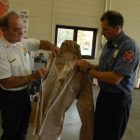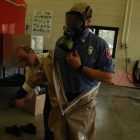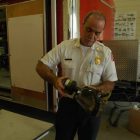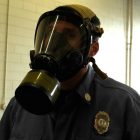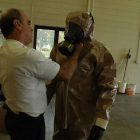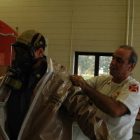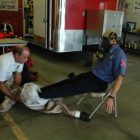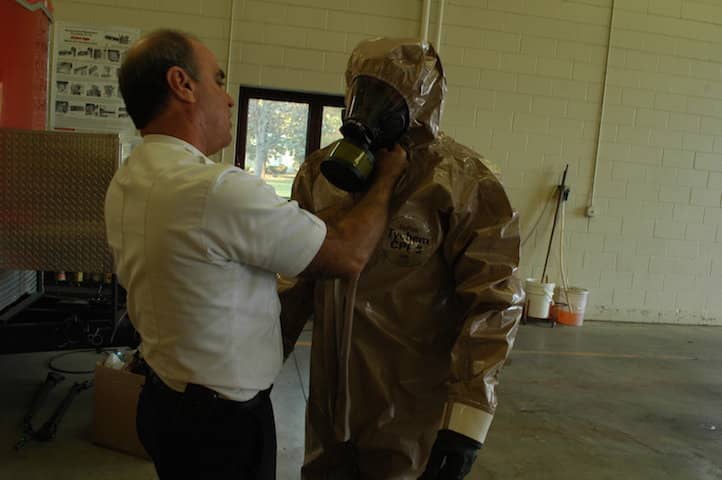
Warwick, RI – If there’s a local case of Ebola, the hemorrhagic fever infecting a growing number of people, mostly in West Africa, Warwick EMTs will be among the first to know, and they’re prepared.
The Ebola outbreak in West Africa is the largest in history with 13,567 cases as of Nov. 5 , but only four in the US, with one death resulting. Only two of those cases were contracted in this country, according to the CDC.
While Ebola is contracted through contact with the body fluids (blood, vomit, feces) of infected, symptom-bearing people, a tough feat for the majority, medical personnel are the most likely members of the community to interact with a local person with Ebola.
The World Health Organization reports the average survival rate of people infected with Ebola at 50 percent. Supportive treatment, including hydration, can improve a person’s chances of recovery.
The first medical personnel likely to interact with an Ebola-stricken person are EMTs.
“We have 100 percent screening right now,” said Lt. Jason Erban at Warwick Fire Station 8, home to the city’s Special Hazards unit.
Jason Umbenhauer, EMS Coordinator for the Warwick Fire Department, said all EMT calls are being screened to determine the level of Ebola risk. Dispatchers taking calls ask specific questions of the callers: Have they traveled to one of the West African countries with widespread transmission of Ebola? Are they experiencing high fever, muscle aches, vomiting or diarrhea?
“So that’s our first step,” Umbenhauer said. Then the EMTs themselves question the patient when they arrive on the scene.
EMT personnel responding to a possible Ebola case arrive in protective gear, “even if it’s low suspicion,” Umbenhauer said. For most EMTs, that consists of a liquid-impervious gown, double gloves, high-filtered respirator and eye protection, in line with current CDC recommendations, he said.
For highly likely or confirmed cases of Ebola, the call will go to the EMTs at Station 8, who have more robust protective gear and training.
“Typically we would call on the Special Hazards Unit (at Station 8) to employ another level of protection,” as well as more thorough training in donning and doffing that protection, Umbenhauer said.
Station 8 responders wear full-body liquid-impervious Tyvek suits with built-in feet and a hood, along with doubled gloves, a face mask and respirator. The hood is also taped up at the neck and where it meets the face mask, to create a sealed protective layer for the EMT, said Frank Colantonio, deputy chief of safety and training at Station 8.
Colantonio and Erban demonstrated the donning and doffing of the protective gear. Both processes require at least three people: the responder, a helper and one observer to make sure nothing is overlooked, Colantonio said.
Once they’re clad in the gear and on the scene, EMTs on a confirmed or highly likely Ebola call will perform limited care, assessing whether IVs or other procedures that may put them at risk are necessary as the patient is moved to Kent Hospital.
Everything used to respond to a possible or confirmed Ebola patient would be disposed of as hazardous waste, Colantonio said, with the exception of the face masks. Erban said the EMTs would scrub each other with a bleach and water solution before taking off the gear, with the gloves coming off last.
After the call, the ambulance used, one prepared with plastic sheeting, would be stripped and cleaned out as well before going back in service, Erban said.
As for the patient, “We’ll go to Kent (Hospital) the way we normally do,” Colantonio said.
At Kent Hospital, personnel are being continuously trained to handle Ebola patients, said Jim Beardsworth, Director of Marketing & Public Relations. All the hospitals in the state are taking similar steps, he said.
“We’re working to ensure as many people as possible are properly trained,” Beardsworth said.
Much of the equipment nurses and doctors will need to protect themselves while treating a possible Ebola patient is part of typical hospital gear, he said.
As with the Station 8 EMTs, Beardsworth explained that hospital caregivers are equipped with gloves, head gear and masks and impervious gowns that can be tied up so no skin is shown, Beardsworth said.
“You’re covered from head to toe,” Beardsworth said. He said full hoods that will cover a person’s head and neck are on order for hospital personnel.
In October, nurses unions in Rhode Island complained that the state’s hospitals were not well equipped or organized to treat Ebola patients, according to the Providence Journal.
Since then, said Rose Desnoyers, president of United Nurses and Allied Professionals Local 5008 at Kent, conditions have improved.
“I think they’ve done a really good job of bringing it to the forefront,” said Desnoyers, “Equipment has been improved.”
Desnoyers said the union is continuing to meet with Gov. Lincoln Chafee and Health Department Director Michael Fine on the issue.
Once an Ebola patient enters a hospital, Beardsworth said, there’s a series of people who’ll provide care to that person, all of whom need to be properly trained to provide care while minimizing the risk to themselves.
Beardsworth repeated that it’s very difficult to get infected with Ebola. Body fluids of an infected person not only need to be in contact with you, but also in contact with some entry-point in the body, like the eyes, nose, mouth, or a cut.
Colantonio said while a person could cough fluid onto someone else, and a risk exists when that happens, that’s different from an airborne virus. Airborne viruses can infect someone via an infectious cloud of droplets, as in tuberculosis and chickenpox, according to the World Health Organization.
Umbenhauer said Warwick EMTs aren’t worried about their risk of catching Ebola, which is less than that of catching tuberculosis, or measles.
“They’re handling it fine,” he said.
In fact, Umbenhauer said, Station 8 responders are used to Hazmat calls involving much more dangerous substances than Ebola, with similar precautions.
“This is what we usually do anyways,” Colantonio said.
This is a test


